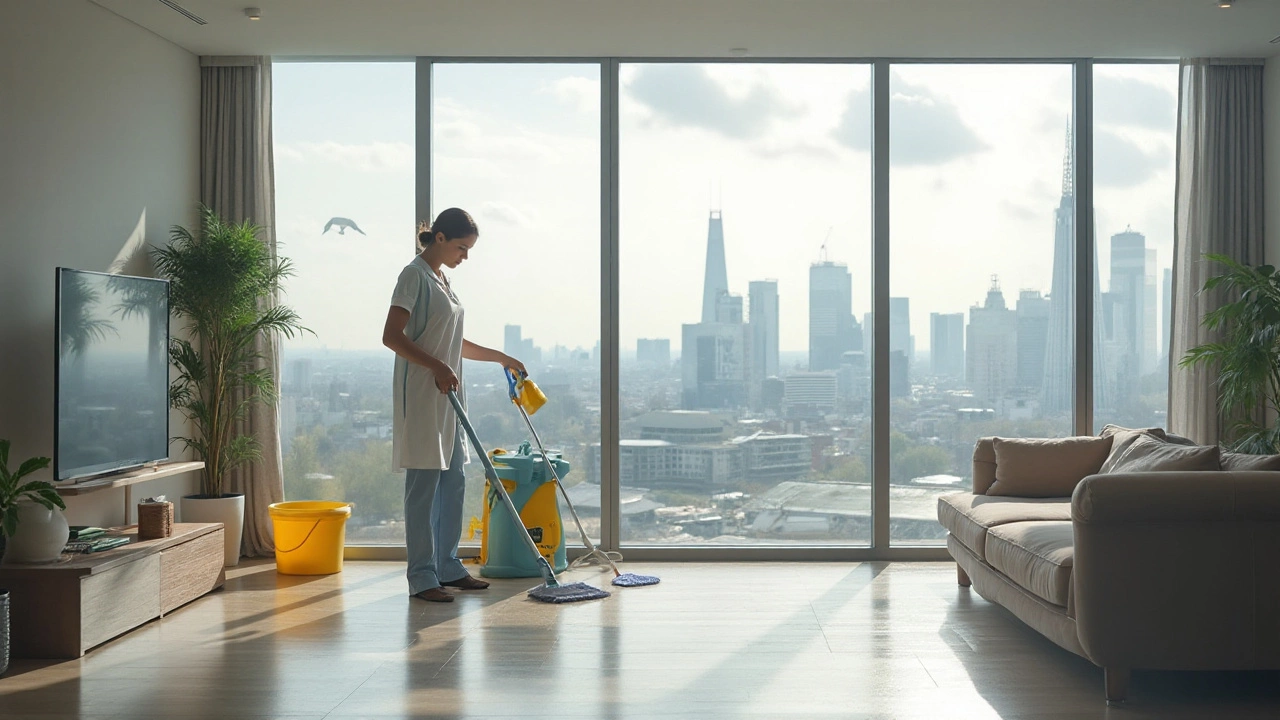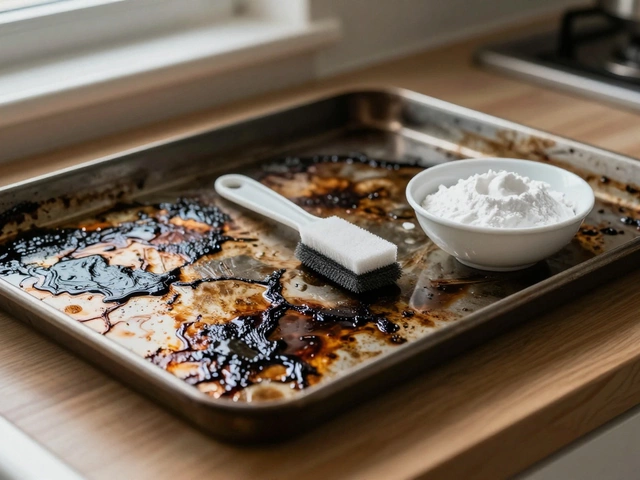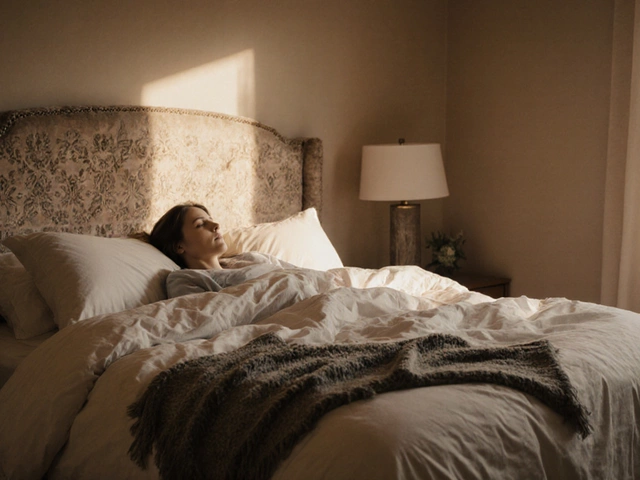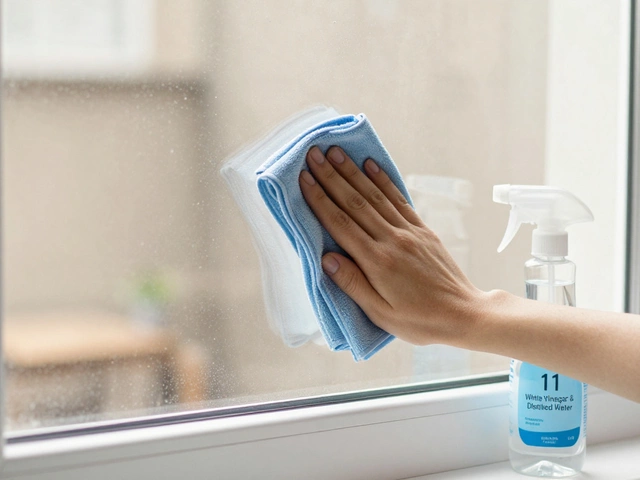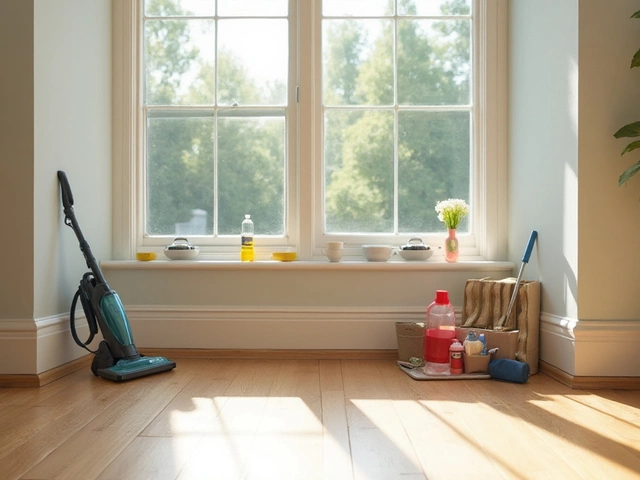Hiring a cleaning lady for an end of tenancy job comes with its own set of challenges and considerations. It's not just about getting the place spotless; it's about knowing what fair compensation looks like and ensuring everything gets done to satisfaction.
Understanding the ins and outs of payment is crucial, as the nature of these tasks can vary significantly. From the size and state of the property to additional services, many elements come into play.
Let's delve into what affects fair compensation for such detailed cleaning services, unravel industry norms, and discover how geographical locations can impact costs.
- Understanding the Scope of Work
- Factors Influencing Payment
- Industry Standards and Guidelines
- Regional Cost Variations
- Tips for a Satisfactory Arrangement
Understanding the Scope of Work
When considering the payment for end of tenancy cleaning, the first thing to grasp is the actual scope of work. Unlike regular weekly cleanings, this type of service is exhaustive and comprehensive. Cleaning ladies or professionals are asked to tackle everything from carpet cleanings to deep-cleaning appliances like ovens and refrigerators. Translating this into work means a more considerable time investment and often, a more diverse skill set than what routine cleaning demands. They might even delve into tasks such as scrubbing grout lines, descaling bathroom fixtures, and cleaning often-neglected areas like the tops of cupboards or the insides of window tracks.
An essential factor to account for in the scope is the condition of the property. If the tenant has maintained a good hygiene level throughout their stay, the cleaning job will inevitably be less time-consuming. On the flip side, properties that have not been regularly cleaned will require more labor-intensive efforts. Cleaning ladies might even find some unique challenges in homes with large windows, multi-storied layouts, or ample deck spaces. It is also not uncommon for them to find damage that needs gentle repair or special attention, like scratches on wooden floors or marks on walls.
Another important aspect is the type of materials and cleaning supplies required for the job. Every property might have different surfaces, each needing specific cleaning solutions and tools to achieve a spotless result. Professionals might need to bring in heavy-duty equipment like steam cleaners for carpets, or specific polishes for hardwood floors. Tenants might also request environmentally friendly products or hypoallergenic options, which require further specialized preparation.
In understanding the scope of work, communication between the cleaning lady and the client is fundamental. A survey before the cleaning day can significantly aid in setting clear expectations and avoiding any unpleasant surprises later on. This assessment can allow the cleaner and the client to discuss if any particular tasks are needed, such as tackling mold spots in bathrooms or restoring severely tarnished metal surfaces in the kitchen. Ideally, this can prevent miscommunication and ensure the end results are satisfactory across the board.
"Thoroughly understanding the work scope not only protects the cleaner but secures a high-standard finish," says Emily White, an experienced cleaning expert.
Lastly, cleaning professionals might be asked to perform additional services such as rubbish removal or garden tidying, which extends beyond regular cleaning. Clarity on these aspects ahead of time ensures that the cleaning process is smooth and efficient, leading to happily signed-off tenancy ends. Each of these components collates to form the intricate web of services included under the umbrella of end of tenancy cleaning, carrying both high expectations and the need for calculated planning.
Factors Influencing Payment
When considering how much to give a cleaning lady for end of tenancy cleaning, several vital factors come into play that can significantly impact the final cost. The size and condition of the property are among the most obvious factors. For instance, a sprawling four-bedroom house that has seen better days will require a lot more elbow grease and time than a compact, well-maintained apartment. Cleaners often assess the amount of dirt buildup and necessary detailed cleaning tasks before quoting a price. If carpets need deep extraction cleaning or the oven requires thorough degreasing, these extras will often mean additional charges.
Another critical factor is the breadth of the services required. Some tenants ask for a comprehensive top-to-bottom service, cleaning every corner from baseboards to ceiling fans, while others might focus only on key areas like the kitchen, bathrooms, and windows, depending on budget constraints or rental agreement clauses. Timing also plays a crucial role; if the service is required on short notice or during peak moving months, a premium might be applied, as these jobs disrupt the normal schedule and might require night or weekend work. Flexible scheduling could save a client money, as the cleaner can fit them in when it’s most convenient.
Then there are specific regional cost considerations. What works in a bustling metropolis like London might not translate directly to a quieter town in the countryside. Urban areas with a higher cost of living will naturally have pricier cleaning services. A 2023 survey indicated that cities could charge up to 20% more than rural areas, reflecting both demand and operational expenses like transportation and parking. Understanding these variances is crucial for setting fair expectations and ensuring that both parties feel the compensation is just.
To ensure satisfaction and fairness in payment, communication between the client and the cleaning service is key. Discussing specific needs and expectations beforehand can avoid misunderstandings. As a professional cleaner might note, "Explaining exactly what’s needed ensures clarity and saves hassle later on." A comprehensive checklist shared with the cleaning lady before beginning the job can also help. It should include all required tasks, from dusting and cleaning surfaces to tackling tougher assignments like scrubbing bathroom tiles or polishing wooden floors.
Experience and reputation of the cleaner can influence payment as well. An experienced, well-reviewed cleaning lady might charge more because of her proven track record of quality and efficiency. Often, you get what you pay for in this industry, and saving money on a less experienced cleaner might lead to less satisfaction in job completion or a need for re-cleaning.
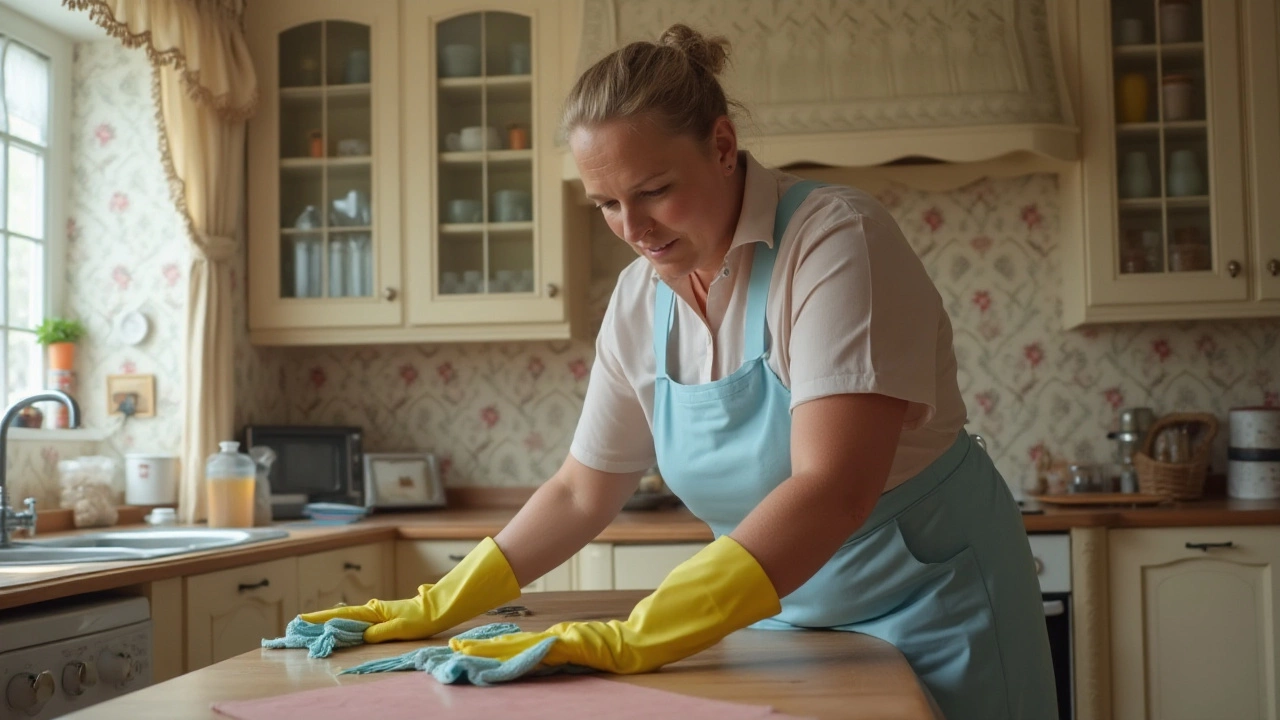
Industry Standards and Guidelines
When it comes to end of tenancy cleaning, understanding the landscape of industry standards and guidelines helps ensure both tenants and cleaning professionals are on the same page. The cleaning industry, especially in critical settings like post-tenancy scenarios, has developed norms that shape expectations and pricing structures. These standards aren't legally binding but offer a framework for fair dealings. Typically, end of tenancy cleaning covers an exhaustive list of tasks: deep cleaning kitchens and bathrooms, steam cleaning carpets, and often tackling areas like ovens and refrigerators.
The most recognized guideline involves the idea of a reasonable cost per hour for cleaning services. According to market research data, the standard hourly rate across many urban areas ranges from $25 to $50. This price fluctuates based on factors like the complexity of the job, additional requirements such as window cleaning or wall washing, and the cleaner’s experience and availability. Many cleaning companies offer a flat rate for full property services, appealing to those seeking clarity in budgeting.
Some standards are more specific. For example, UK-based guidelines, which are widely recommended by major letting agents, emphasize the importance of a detailed checklist that aligns with landlord expectations. They suggest that cleaning services should confirm that they utilize approved products and methods to avoid damage, particularly to delicate surfaces. This adherence to quality can influence quotes but assures thoroughness.
"Effective cleaning is not merely about doing more—it is about doing it right and ensuring the highest standard through experience and understanding," says Jane Finch, Chair of the National Cleaning Association, highlighting the necessity for professional conduct in cleaning services.
Another key aspect of these guidelines is transparency in communication between the tenant and the cleaning provider. A mutual understanding of the job scope, estimated duration, and specific client preferences helps set the stage for satisfactory service. Reputable cleaning companies often document these agreements in writing, safeguarding all parties involved.
A study by the Global Cleaning Forum found that in cities, where cleanliness standards are notably high due to market demands, tenants often see the cost of cleaning as a worthwhile investment towards safeguarding their deposit return. Nevertheless, pricing models continue to adapt as more ecological cleaning practices and sustainable solutions come to the fore, which might occasionally command premium rates. With these shifts, it's prudent for tenants to weigh the significance of industry best practices, ensuring a smooth transition in and out of rented properties.
Regional Cost Variations
When it comes to paying a cleaning lady for end of tenancy cleaning, one of the most significant influences on the rate is the geographical region where the service is performed. Across different parts of the world, and even within a single country, the cost of living, local economy, and demand for cleaning services can greatly affect pricing. For instance, areas with a high cost of living such as cities like New York or London often see higher rates for cleaning services compared to smaller towns or rural regions. This isn't just about wage expectations; these urban centers tend to have higher operational costs that service providers need to cover.
Interestingly, the type of housing prevalent in a region also plays a role. In densely populated areas where apartment living is more common, cleaning services might offer competitive rates due to the typically smaller square footage needing attention compared to sprawling suburban homes. Yet, the higher concentration of potential clients can push demand up, leading to variable pricing strategies. It's also worth noting how local regulations can influence costs. In many urban areas, labor laws might require higher minimum wages and benefits, directly impacting how much a cleaning lady needs to charge.
According to a recent study by the Cleaning Industry Research Institute, "Regional pricing variations can differ by as much as 30% due to cost of living and local labor laws, making it essential for tenants to understand their local market before agreeing on rates." This highlights the necessity of researching the average rates in one's specific locale to avoid overpaying or undervaluing these critical services.
Comparing Costs Across Regions
Several platforms and industry reports provide insights into these variations. As of last year, data compiled by various cleaning agencies indicated that the average hourly rate for cleaning services in major metropolitan areas in the United States ranged from $25 to $45. Meanwhile, in less economically bustling areas, clients might see rates from $15 to $30. This disparity underscores not only the regional differences but also the necessity of using local averages as a benchmark rather than relying solely on national data. Some service providers may even offer different packages tailored to the client base they predominantly serve, influenced by these regional dynamics. Tenants looking to hire a cleaning lady for their apartment at the end of their lease should assess multiple quotes to get a feel for an appropriate price range in their area.
These regional cost variations mean that what seems standard in one location might be considered expensive elsewhere. It's vital for tenants to do their homework, ask around for local recommendations, and perhaps even negotiate based on what other similar clients have been quoted. This way, they ensure fair compensation while staying within their budget, maintaining a balance that respects both the client's needs and the value of the labor provided by the cleaning service.

Tips for a Satisfactory Arrangement
Crafting a satisfactory arrangement when hiring someone for end of tenancy cleaning requires thoughtfulness and clear communication. Start by having open discussions about expectations. Take the time to walk through the property with your cleaning lady, pointing out areas that might need special attention, like grime-heavy kitchen stovetops or bathroom fixtures that may have gathered rust. A detailed checklist can be an invaluable tool here, bridging any potential gaps in understanding and ensuring that everyone's on the same page.
Discuss the time commitment required for certain tasks, and ensure that there's enough time allocated for each part of the house. Some regions have a tradition of thorough cleaning that takes several more hours compared to others, which might only budget a couple of hours per day for the job. Acknowledge these differences by aligning on a realistic timeline. In some cases, addressing time may require adjusting payment, so it’s mutually beneficial. According to the Bureau of Labor Statistics, cleaning positions often rank high in physical demand yet modest in pay, which emphasizes the need for fair compensation.
Another key point to consider is providing access to necessary supplies. While some cleaning professionals come equipped with their preferred tools and cleaners, there might be instances where they need items tailor-fit for your home's needs. Lightly scented products may be more suitable for allergy-prone individuals, or if pets are around, ensuring products are safe becomes a priority. Review these details initially to avoid any surprises down the line.
Providing this transparency fosters trust and efficiency. As industry expert Rachel Stevens notes, "A clear, fair agreement not only ensures cleanliness but also nurtures a respectful partnership that could last beyond just one cleaning."
To wrap up the arrangement specifics, clarify if there are additional services your cleaning lady might offer or if there is flexibility in scope. This could include services such as garden cleaning or minor packing assistance. Sometimes, these extra services can be negotiated at a bundled rate, providing value both in cost and time management. Often, a modest tip doesn't go unappreciated either—it signifies your satisfaction and gratitude, fostering good will and trust.
Implementing these tips can build a more pleasant experience for both parties involved. By taking steps to lay the groundwork with a proper agreement, your cleaning lady knows exactly what’s expected, and you can rest assured knowing your space will meet the high standards needed at the end of your tenancy. This effective communication and respect can be as lasting as the sparkle left behind.
